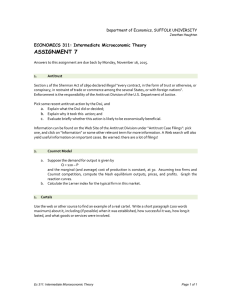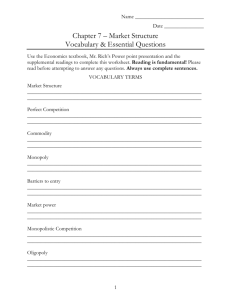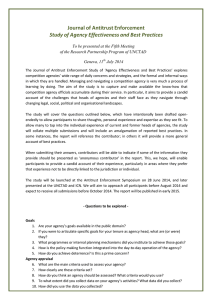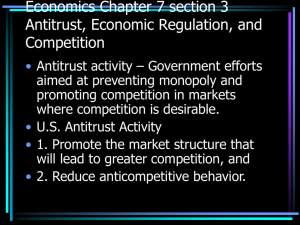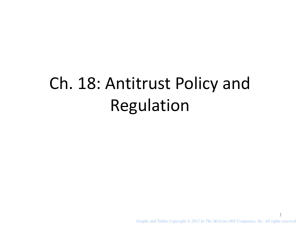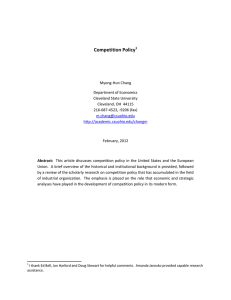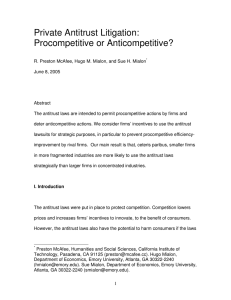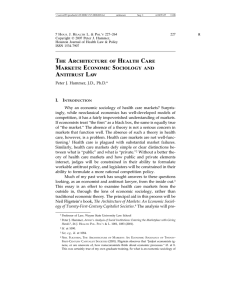Ad-Hoc Expert Group on the Role of Competition Law and
advertisement
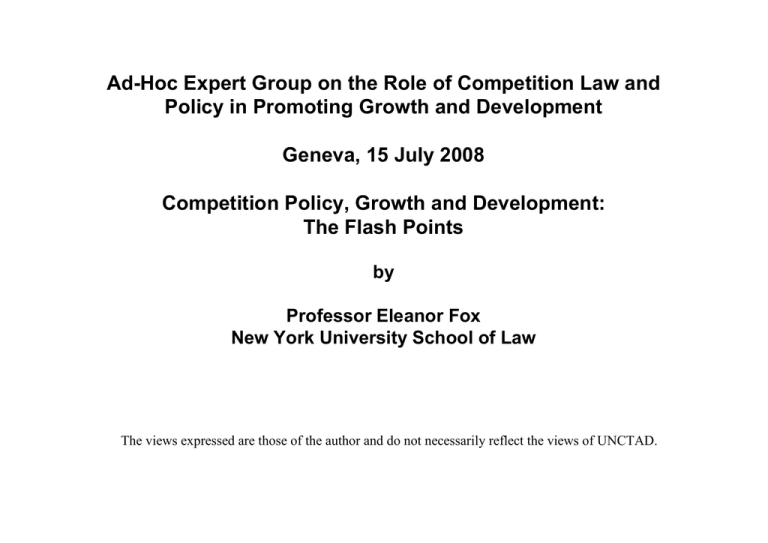
Ad-Hoc Expert Group on the Role of Competition Law and Policy in Promoting Growth and Development Geneva, 15 July 2008 Competition Policy, Growth and Development: The Flash Points by Professor Eleanor Fox New York University School of Law The views expressed are those of the author and do not necessarily reflect the views of UNCTAD. COMPETITION POLICY, GROWTH AND DEVELOPMENT: The flash points Professor Eleanor Fox New York University School of Law UNCTAD Geneva 15 July 2008 2 OUTLINE • 1 Growth, competition and poverty • 2 The role of competition in growth – Competition policy – Competition law • 3 The three flash points: growth, development, convergence • 4 How the developed world must help 3 1. Growth and competition • Evidence, though there is little: – Tends to confirm link between competitive environment and economic growth • Firms facing competitive environment perform better • Research: DG EcFin doing study for Europe 4 Growth: why growth? • “Growth is not everything. But it is the foundation for everything. The poorer the country the more important growth becomes, partly because it is impossible to redistribute nothing and partly because higher incomes make a huge difference to the welfare of the poorest.” Martin Wolf, FT 3 June 2008 • “fast growth [goes] with fast poverty reduction” • William Easterly, The Elusive Quest for Growth (2002), noting studies showing strong expansion (8.2% increase in avg incomes per year) entailed 6.1% reduction in poverty per year p 13 5 cont’d • “Growth is not an end in itself. But it makes it possible to achieve other important objectives of individuals and societies. It can spare people en masse from poverty and drudgery. Nothing else ever has. It also increases the resources to support health care, education, and the other Millennium Development Goals to which the world has committed itself.” – The Growth Report, Commission on Growth and Development, 2008 6 The policy ingredients of growth • What factors and policies produce growth? • An open integrated world economy • allows economies to import ideas, technologies, knowhow, e.g. through FDI, • • • • foreign education • Allows markets for exports Resources must be mobile Property, contract rights Domestic savings Effective government leadership, investment in infrastructure, health, education; institutions (see also Kovacic) • Relying on markets to allocate resources “is clearly necessary … but that is not the same thing as letting some combination of markets and a menu of reforms determine outcomes” cont’d 7 cont’d • “if large numbers of people do not feel any improvement in their circumstances, then there is more work to do” • Social protections, equity; protect people (not jobs) • “equity and equality of opportunity are essential ingredients of sustainable growth strategies.” • Experiment, and do what is possible – Deng Xiaoping: “cross the river by feeling for the stones.” – The Growth Report 8 De Soto’s El Otro Sendero: a path to growth and development • Fighting the Shining Path in Peru, Hernando de Soto outlined a path of inclusiveness • Tear down government barriers such as dense licensing • • requirements Enable the poor to move from the informal economy, to participate in formal economy Build ladder for mobility • Ladder for mobility and robust competition – as guide and symbol for developing countries’ antitrust 9 2. Role of Competition Policy, Law • Competition policy – Highly relevant, removing impediments • Advocacy – the de Soto agenda • Incumbents will ask for protection; should not get it • New companies, new technologies will be the hope – “some empirical studies suggest that economies owe most of their progress to the entry of new, more productive firms, and the exit of ailing ones. Improvements in the efficiency of incumbent firms play a smaller role. … This means that entry and the threat of entry are important to ensure competition.” The Growth Report 10 Competition Law • Competition LAW is law to preserve competition – which should produce efficiency, keep markets accessible on the merits, and benefit consumers and [potentially] efficient, innovative firms • Translates to: prohibitions against anticompetitive • agreements, abuse of dominance, mergers • But what does “anticompetitive” mean? • Clearly, cartels and boycotts in support • But what is the baseline for condemning or inviting everything other than cartels? What is consumer welfare and efficiency, and how should nations reach it? – The three flash points: growth, development, convergence 11 3. Sources, guides of/for antitrust law appropriate to developing countries • • • Established principles in the world • Basic principle: antitrust for markets and consumers • NOT to protect inefficient competitors from competition • NOT to create market power or empower national champions – Value of adopting established principles: • coherence, market integration Development Growth 12 Characteristics of many developing countries • • • • • • • • Statism Corruption Closed markets and privilege Large informal economy Poor infrastructure High ownership concentration, high barriers Weak corporate governance Weak financial markets – See Mark Dutz, R. Shyam Khemani describing “tyranny of predatory vested interests,” … Challenges in South Asia 2007 13 Marrying country characteristics with antitrust policy perspective: • Distinguish basic principles from rules of antitrust – Should developing countries adopt all of the antitrust rules of the industrialized world? – There is room for argument that some contemporary rules may protect market power rather than competition and consumers • See R. Pitofsky ed, Where the Chicago School Overshot the Mark: Effect of Conservative Economic Analysis on U.S. Antitrust (forthcoming Oxford 2008) • Consider in contrast, The Growth Report – Importance of entry and access of new and young firms, even more than static efficiencies of old firms – Equality of opportunity is “essential ingredient” of growth strategy 14 Cont’d • Consider the types of practices that bedevil and target developing countries see data of Frederic Jenny, Simon Evenett – What hurts developing countries the most is largely illegal in world • But – there is a small margin where developing countries might choose to err on side of • protecting opportunities of new firms to compete on merits more than freedom of action of dominant firms • Thus, COMPETITION LAW WITH AN EYE TO MOBILITY, ACCESS, OPENNESS, AND INCLUSIVE GROWTH 15 4. The Role of the Developed World: duty of cooperation • “Developing countries cannot grow without the support of the advanced economies. In particular, they need access to the open global trading system.” The Growth Report • They need to be free from harm from world cartels, especially those targeted at them from developed nations, and they cannot get this on their own 16 Developed countries’ duty • In spirit of EU proposal to WTO, developed countries should help developing countries, especially when the developed country’s own nationals are the violators of clear shared principles of antitrust. – The developed countries should revise their laws, extending jurisdiction so as to make hardcore export cartels illegal. • Basel Convention as model and testament to political possibility: Basel Convention on the Control of Transboundary Movements of Hazardous Wastes – If a signatory country prohibits import of hazardous wastes, all other signatories must make illegal the shipment of hazardous wastes to that country. – The United States and other developed countries should adopt this model for hardcore export cartels, which are the hazardous wastes of antitrust. 17 Duty, cont´d • Failing that, the United States and other developed • countries should amend their antitrust laws to provide jurisdiction for the discovery of documents and testimony from knowledgeable people regarding lawsuits against them and other nationals launched abroad. This should include subpoena power when the developed country’s citizens are the alleged victimizers of the people of developing countries. Thus, a cosmopolitan vision; a modest imperative for developed nations to accept responsibility for the harms they cause. 18 CONCLUSION • The three flash points for developing countries – follow the lights of growth, development, convergence • The one flash point for developed countries – enable growth and development of developing counties by measures to stop the export of the “hazardous wastes” of antitrust 19
